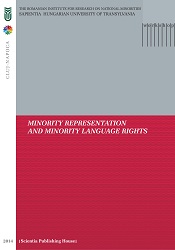Minority Language Rights in Europe: from the Austro–Hungarian Monarchy to the Supranational Organizations
Minority Language Rights in Europe: from the Austro–Hungarian Monarchy to the Supranational Organizations
Author(s): László Marácz
Subject(s): Politics / Political Sciences, Language and Literature Studies, Law, Constitution, Jurisprudence
Published by: Scientia Kiadó
Summary/Abstract: The European language landscape is traditionally characterized by linguistic diversity. In historic and contemporary Europe, the establishment of state structures has caused the creation of all sorts of national and ethnic minorities. It has been observed that their linguistic rights have been represented satisfactorily in the modern period if within the framework of the Empire or State a concessive policy towards linguistic diversity existed, i.e. a policy allowing the inclusion of minority languages. Hence, there is a strong correlation between the granting of minority language rights by the State and a policy accommodating linguistic diversity by the same State. From this it follows that minority language rights are to be studied as a sub-case of a more general policy including linguistic diversity. Note, however, that even in a hierarchy of languages minority languages might be at the bottom remaining without official rights. So, the recognition of linguistic diversity is a necessary condition for minority language rights but not a sufficient one.In this paper, we will study this correlation between minority language rights and multilingual policy in the European context. In fact, two types of state structures come to mind for deeper investigation. Firstly, the multilingual federal states, those that go beyond the monolingual nation-state dominating the paradigm of the twentieth century, starting with the late Hapsburg Empire but including federal enterprises, such as former Yugoslavia and Switzerland. Secondly, the supranational organizations of states that came into being with the League of Nations after the First World War. Here, we will restrict ourselves to a discussion of minority language rights within the framework of the contemporary supranational organizations in Europe, namely the European Union (EU), the Council of Europe (CoE) and the Organization for Co-operation and Security in Europe (OCSE). Comparing and analyzing the minority language rights’ regimes in both types of state structures will allow us to receive more insight into the contents, conditions, boundaries and historical developments of minority language rights in Europe.
Book: MINORITY REPRESENTATION AND MINORITY LANGUAGE RIGHTS
- Page Range: 101-125
- Page Count: 25
- Publication Year: 2014
- Language: English
- Content File-PDF

